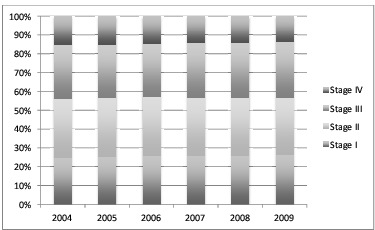|
Back to Annual Meeting Posters
Increasing the Number of Lymph Nodes Examined After Colectomy Does Not Improve Colon Cancer Staging
Cristina N. Budde*, Daniel O. Herzig, Kim C. Lu, Brian S. Diggs, Karen Deveney, Vassiliki L. Tsikitis
SURGERY, OHSU, Portland, OR
Objectives:
Current quality initiatives call for examination of a minimum of 12 lymph nodes in curative colon cancer resections. The aim of this study was to determine if the number of nodes resected has been increasing, and if an increasing number of resected nodes correlates with upstaging of tumors and improved survival.
Design:
Review of Surveillance, Epidemiology and End Results (SEER) data from years 2004-2009 was performed. All patients who underwent colon cancer resection during this date range were analyzed. Number of nodes retrieved, patient stage, and survival by stage were examined. Multivariate analysis was performed, examining stage, cancer site, age, and number of nodes retrieved.
Results:
A total of 131,301 patients met inclusion criteria. An average number of nodes analyzed increased sequentially with each year examined, from 12 in 2004 to 16 in 2009. Despite greater number of nodes obtained and analyzed, there was no clinically significant change in stage, overall survival, or survival by stage. On multivariate analysis, controlling for stage and site of disease, there was improved survival with increasing nodal retrieval (hazard ratio 0.9840 for each additional node removed, 95% CI 0.9829-0.9852, p<0.001).
Conclusion:
The current quality initiative has succeeded in increasing the number of nodes examined in colon cancer resections, but has not led to upstaging of tumors. The improved survival seen with higher node counts was independent of stage, site of disease, or patient age. This suggests that patient related immunologic factors might explain the relationship rather than the quality of the surgical resection. The current quality initiative needs to be investigated further to determine if surgical quality or non-modifiable patient factors are responsible for the improvement in survival.

Colon cancer stage expressed as a percent of cases each year
Back to Annual Meeting Posters
|


